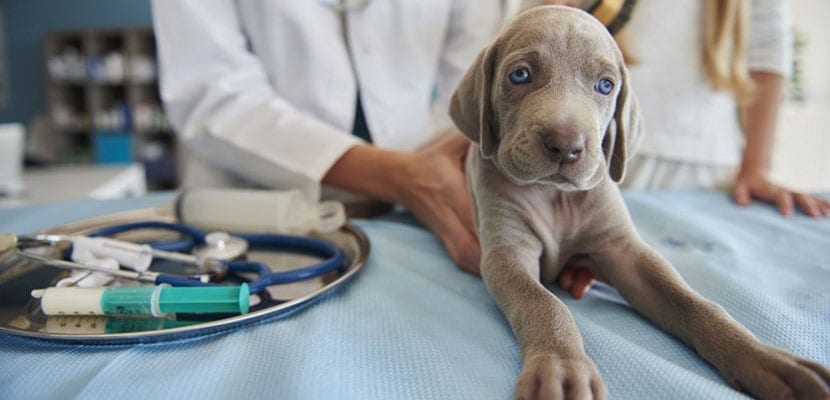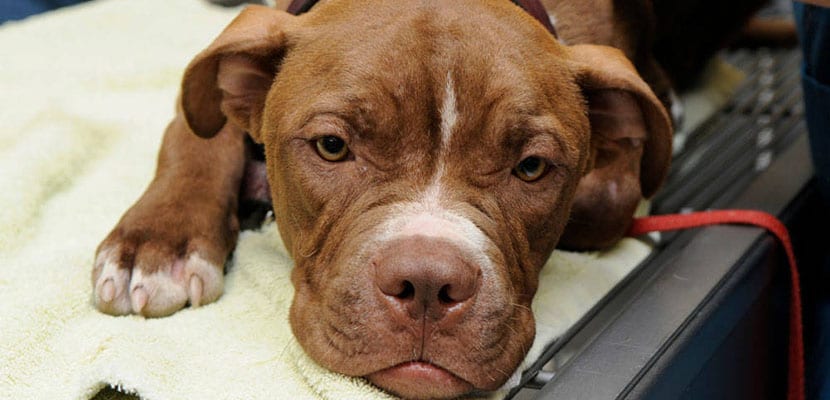
El parvovirus is a virus that affects the digestive system of the dog and that can occur especially in puppies and adult dogs that have never been vaccinated. It is a disease that can lead to the death of the dog in a fairly short time, so it is essential to recognize it and apply the appropriate treatment in order to help the dog in its recovery.
Parvovirus is not well known because puppies are usually separated from other animals while they are not vaccinated, which means that they do not contract any of these viruses, but in places such as kennels and animal shelters they are well known, since outbreaks of these viruses can lead to the death of several animals due to how quickly it progresses and how it deteriorates the dog.
What is parvovirus
Parvovirus is a very serious canine viral disease and in many cases it can be fatal, making it one of the worst diseases that a dog can face. In general It is a disease that affects puppies, as they are more vulnerable and have not received any vaccines. However, it can also affect adult dogs, especially if they are not vaccinated and to a lesser extent those that have already been vaccinated. In any case, no dog is free from contracting the disease, so when it is identified it is important to isolate the dog to avoid further infections.
How it spreads

Parvovirus is very stable in the environment and therefore can remain active for months in the same place. Public places can become a source of infection, such as dog parks, kennels or leisure parks. Another problem is that contagion occurs by dealing directly with infected dogs, by being in an infected area, in contact with feces or urine of an infected dog or in contact with infected objects. If we went through an area and carried it, we could even take it home in our shoes and thus infect our dog. That is why it is a virus that usually causes real epidemics and is difficult to combat and eliminate. If we have had it at home, we will have to disinfect everything, even the footwear, since we could take it outside and continue to infect other dogs.
How to recognize parvovirus in dogs and puppies
Parvovirus primarily affects the dog's digestive system and spreads rapidly. There are two forms of parvovirus, one that affects the heart, causing heart failure and various heart failure, or only affecting the intestinal tract. The most distinguishing symptom is diarrhea with dark stools due to the fact that they are bloody. Parvovirus also causes listlessness, tiredness and weakness in the dog, in addition to fever. There is often recurrent vomiting with blood and the dog becomes dehydrated quickly. One way to see if the dog is dehydrated is to grasp the skin and release it. If you return to the site quickly, you are still hydrated, but if it takes you long, it begins to dehydrate significantly.
The main problem with parvovirus is that many owners are not aware of the disease and its symptoms can easily be mistaken for gastroenteritis or a simple stomach upset. Fever and blood in the stool are the key factors in distinguishing this disease with such common symptoms.
What to do if my dog is infected
When suspecting parvovirus, it is very important to go quickly to the vet, because this virus progresses rapidly and can affect the heart of the pet or to weaken him so much that his organs cannot bear the effort. It is even more important if the dog is older, has been ill or is a puppy, as it has a greater chance of becoming a fatal disease for him.
The big problem when it comes to fighting this virus is that there is no drug that kills him, so the treatment will be aimed at reducing the problems derived from the virus so that the dog can fight it and get ahead. This is what makes it such a dangerous disease, as recovery depends largely on the strength of the dog and how quickly we detect the problem to begin treatment. In the veterinarian they usually administer systemic antibiotics to end secondary infections caused by the virus and add fluid therapy, intravenously if the dog is too weak to drink. This helps to curb the virulence of the disease and to strengthen the dog so that it can cope.
Puppies with parvovirus

Although this disease can affect adult dogs, it is much more common and lethal in puppies, which is why they are usually more worrisome. Those without vaccines are totally vulnerable to the disease and will become dehydrated very quickly, so we have to take them to the vet immediately. Early treatment can slow down the disease by preventing it from affecting your heart. After an analysis of his feces, if the virus is detected, the veterinarian will hydrate him and begin treatment to alleviate these symptoms. The drug Tamiflu and the administration of antibiotics have also been shown to be effective. But in any case, it must be borne in mind that nothing that is currently available is 100% effective in ending parvovirus, so it is a disease in which we really cannot know if the dog will get ahead until we see the evolution in the hours following the treatment.
How to avoid and prevent parvovirus
If we have a puppy at home, what we should do is avoid contact with other dogs while we have it and leave the shoes outside the room where we have these dogs. It is also a good idea to change the clothes we bring from the street. There are many precautions but unvaccinated puppies are exposed to all kinds of diseases that for them can be lethal in a matter of hours, so it is our responsibility to keep them away from these possible health problems.
In adult dogs it is important to have their vaccinations up to date and that their health is optimal, with a quality diet so that your body is in perfect condition to fight the virus in case of contracting it. It is unusual for a vaccinated dog to be affected by this type of virus but it can happen, so good health would help the dog to recover in less time from this virus.